Can Guinea Pigs Live Alone? Short Answer is NO, They Shouldn't. So Here Are the Steps to Introduce Guinea Pigs.
Guinea pigs are social animals, meaning guinea pigs can not and should not live alone. They enjoy companionship and social interaction with other guinea pigs. In larger groups, they feel safer and therefore happier. Guinea pigs living in groups are more confident, more susceptible to mental stimulation, have a more diverse diet, and are generally healthier. Guinea pigs raised alone are usually more stressed, less active, vocal, and more susceptible to illness. Interaction with your guinea pigs is very important, but no human interaction or care can replace bonding with their own species. We recommend always having at least two guinea pigs in a home so that they will have a companion.

Here are some steps and things to watch out for when introducing new guinea pigs!
1. Quarantine

Guinea pigs need time to adapt to new things and can be very territorial of their space. Patience and gradual progress is a must to successfully introduce guinea pigs. The first step is to isolate the new guinea pig until you are sure that he/she is not sick or pregnant. If you really can not isolate them, ask your veterinarian to conduct a full health check on your new guinea pig. Do not place your new guinea pig into the same hutch with your old guinea pig right away.
2. Establishing Dominance

Try to pair the dominant guinea pig with a younger and more passive guinea pig. If you don't know what their personality is like, an older and younger guinea pig is a good start. Physically larger and smaller guinea pigs are also a way to go. They usually establish a natural hierarchy, younger guinea pig to an older one. Note that you should not have a very feisty younger guinea pig with a more laid back older guinea pig. In this case, the young one may challenge the older alpha guinea pig’s position. To read more on why guinea pigs may be fighting you can read our other blog post: 5 Reasons Why Your Guinea Pigs Might Be Fighting.
3. Gender

If you have a male, it's better to have another male. If you have a female, you will want to pair it with another female. This is the easiest way to go because it does not require neuter or spay surgery. If you happen to have a female and male in the same cage, they could start breeding very quickly. Guinea pigs can sometimes hide pregnancy really well, so be aware. Generally speaking male guinea pigs are a bit more territorial, so when introducing 2 male guinea pigs, make sure to give them plenty of room.
4. Location

Find a neutral space like outside in a contained area or a spare room for them to meet for the first time. Make sure the hutch or cage is large enough so that they have somewhere to escape from if they feel overwhelmed. The minimum size is 7.5 square feet for two guinea pigs living together but providing the most space possible is ideal for the first meeting. Choose a quiet, enclosed and spacious space that makes both feel safe. Block all interfering factors, such as loud TV, children or other pets. Do not try to force the guinea pigs together. Give them time to build confidence and become comfortable enough to be close to each other. Providing a plentiful amount of fresh veggies can alleviate any worries and help them stick together, be sure to supervise them in case a fight starts. They may start to connect with each other by receiving treats.
5. Clean Cage

If you are adding a new guinea pig to the existing hutch where the old guinea pig lived, make sure you clean the hutch completely and rearrange it so that the two guinea pigs will feel like the hutch is neutral territory. A tip would be to gently rub the hay from the old cage to the new guinea pig’s temporary space so he/she smells more like other piggies before joining.
6. Fights

Make sure you make time to monitor their behaviors and constantly look for positive and negative behaviors. Some positive behaviors would be grooming each other, lying next to each other and sharing food and water. Expect to see some concerning behaviors at first. Concerning behaviors to watch out for are constant teeth chattering, biting, hiding from each other, and chasing. Some of these behaviors are expected in the beginning but if your piggie shows aggression and looks stressed out, end the session early and try it again the next day.
Conclusion
Introducing a new guinea pigs into a home can always be stressful for both you and your piggies. However, be patient with them because in the end, your piggies will be happier with a companion to live with.
Let us know if there is more Information you'd like to see!













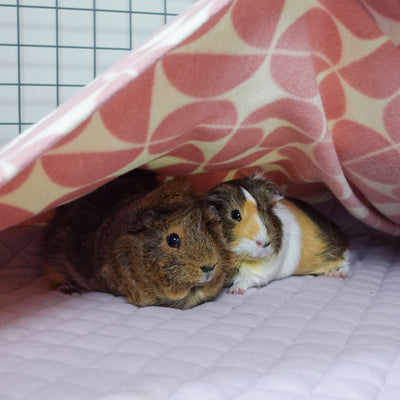










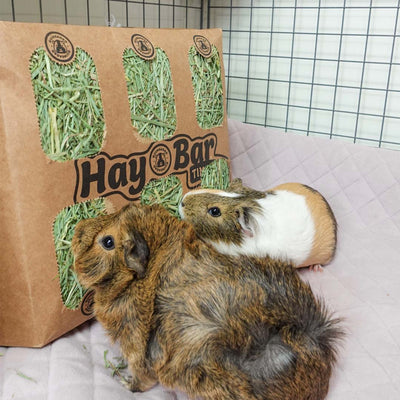

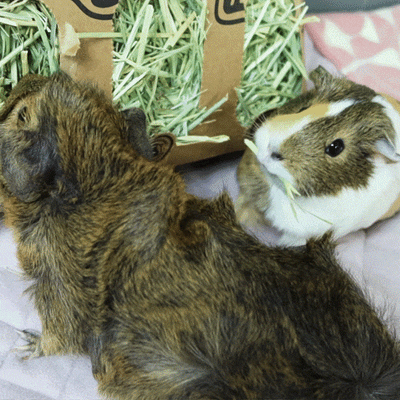
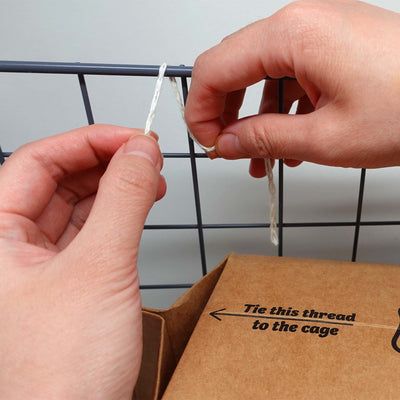

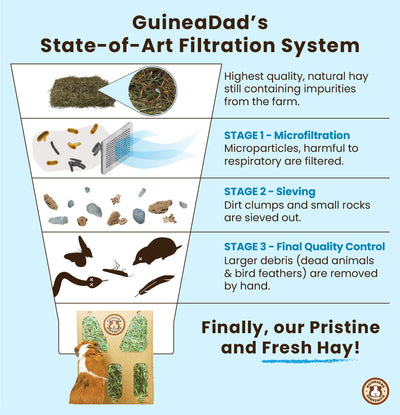


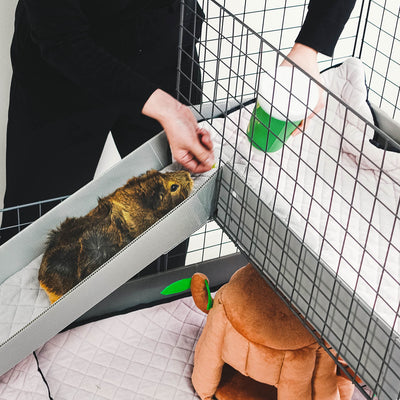
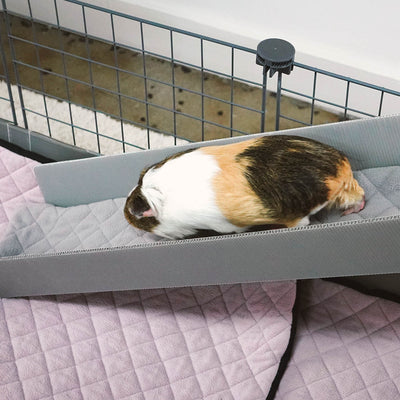


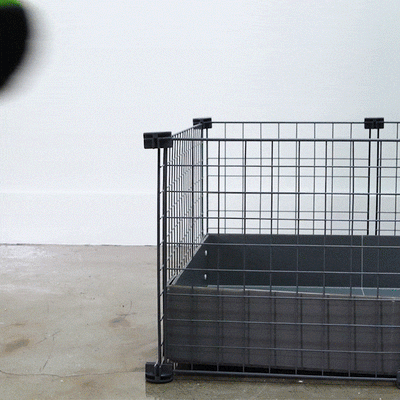














12 comments
Hi Gwen – I’m sorry to hear about the change in behavior between your two piggies. Sudden aggression or fighting between previously friendly guinea pigs can be concerning. There are a few potential reasons for this change in behavior, and it’s important to address the issue promptly to ensure the well-being of your pets.
Hormonal changes: Guinea pigs, especially males, can go through hormonal shifts that may lead to aggression and territorial behavior. If your piggies are both males, this could be a possible cause.
Lack of space: Even if they were fine sharing a cage initially, as guinea pigs grow, they may require more space to establish their territories. Inadequate space can lead to conflicts and fighting.
Stress or illness: Guinea pigs may exhibit aggressive behavior if they are under stress or feeling unwell. It’s important to consider if there have been any recent changes in their environment or if they are showing signs of illness, such as loss of appetite or lethargy.
To address the issue and help them potentially become friends again, you can follow these steps:
Separate them: It’s good that you’ve already separated them to prevent further injuries. Ensure they have their own individual living spaces for now.
Observe and monitor: Keep a close eye on their behavior. Watch for signs of continued aggression or any health issues. If the aggressive behavior persists or worsens, it may be necessary to keep them permanently separated.
Provide separate spaces: Create separate living areas for each guinea pig with appropriate space, bedding, food, and water. This will reduce the chances of further conflicts and allow them to have their own territories.
Gradual reintroduction: If they show signs of calming down and no further aggression after a period of separation, you can attempt a gradual reintroduction under close supervision. Start with short supervised play sessions in neutral territory, gradually increasing the time. If aggression resumes, you may need to keep them permanently separated.
Consider neutering: If your guinea pigs are males and the aggression continues despite separation attempts, consulting a veterinarian about neutering one or both of them might help reduce aggressive behaviors.
Remember, guinea pigs are social animals, and it’s always better for them to have a companion. However, in some cases, due to ongoing aggression or other factors, it may be necessary to keep them separated for their safety and well-being. Consulting with a veterinarian experienced in guinea pig behavior can provide further guidance tailored to your specific situation.
Hi guineadad! What do i do if my 2 piggies suddenly hate each other?. theyre on the same cage for a month with no prob at all but just this week they chatter and fight a lot and got injuries. I separated them already but i miss the days when all my piggies get along with each other. What might be tje reason of their sudden change of behavior? And is there a possibility they will be friends again? Thanks
My name is Kayla and I just bought 2 guniea pigs. I’ve had them for 3 days and they are hiding. I’ve tried to touch them but I think they’re scared. I don’t want to force it but when should I start to worry and what should I do next? I’ve never had guniea pigs before. They are both females and their names are Sophie and shalimar.
Hello guineadad.com owner, Your posts are always well-written and easy to understand.
I have two females that I have introduced them slowly (2-3 days). They have been together now for over a month and a half At first things went well but within the last 2 weeks my younger females has been rumble strutting and chasing and mounting my older female. Their area is 2 ft by 5 ft. I feel my younger piggie is always rumble strutting and picking on my older one. The older one won’t even let me touch her she just runs away and hides. Do I need to separate them? Why is my one female always rumbling and picking on my other one? My younger piggie was my first one and I had her for about 8 months when I rescued my older piggie. What should I do?